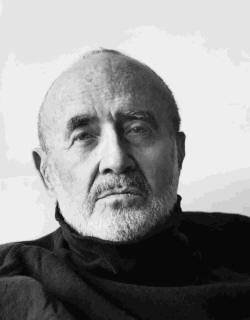

Partner Charlie Yordy, Doug Gruenau
Queer Places:
Cornell University (Ivy League), 410 Thurston Ave, Ithaca, NY 14850
Harvard University (Ivy League), 2 Kirkland St, Cambridge, MA 02138
W 88th St, New York, NY 10024
 Harold Brodkey (October 25, 1930 – January 26, 1996), born Aaron Roy Weintraub, was an American short-story writer and novelist. At the time of his death in 1996, he was living in New York City with his wife, novelist Ellen Schwamm. When marrying, Harold Brodkey practically denied his past, and with that
Charlie Yordy, who was his in-live lover until 1975, and who later died of AIDS as well, and
Doug Gruenau, his lover
until 1980 (and for a period in a menages a trois with Charlie, they were all
living together in a big West Side apartment), who moved out Harold's life to
find a new serious partner.
Harold Brodkey (October 25, 1930 – January 26, 1996), born Aaron Roy Weintraub, was an American short-story writer and novelist. At the time of his death in 1996, he was living in New York City with his wife, novelist Ellen Schwamm. When marrying, Harold Brodkey practically denied his past, and with that
Charlie Yordy, who was his in-live lover until 1975, and who later died of AIDS as well, and
Doug Gruenau, his lover
until 1980 (and for a period in a menages a trois with Charlie, they were all
living together in a big West Side apartment), who moved out Harold's life to
find a new serious partner.
Brodkey was the second child born in Staunton, Illinois, to Max Weintraub and Celia Glazer Weintraub (1899-1932); Samuel Weintraub (1928-2017) was their oldest child. He was Jewish. When their birth mother Celia died, Samuel Weintraub was four and old enough to remain with his father but Aaron Weintraub, only two years old, was adopted by his father's cousin, Doris Rubenstein Brodkey (1896-1949) and her husband, Joseph Brodkey (1896-1946) and renamed Harold Roy Brodkey. Doris and Joseph lived in University City, Missouri, with their daughter, Marilyn Ruth Brodkey (1923-2011). Brodkey would chronicle his life with his adoptive parents and sister in his short stories and his novel, The Runaway Soul. After graduating from Harvard University with an A.B. cum laude in 1952, Brodkey married his first wife, Joanna Brown, a Radcliffe graduate and, in 1953 their only child, Ann Emily Brodkey was born. With the aid of his editor, William Maxwell, a childhood friend of his wife, Brodkey began his writing career by contributing short stories to The New Yorker and other magazines. His stories received two first-place O. Henry Awards. Brodkey was a staff writer for The New Yorker until the end of his life. In 1993 he announced in The New Yorker that he had contracted AIDS; he later wrote This Wild Darkness: The Story of My Death (1996), about his battle with the disease. Brodkey contracted the HIV virus from a homosexual relationship, though he reportedly did not consider himself to be gay.[2] The author is most famous for his breathtaking conversational skills, his progressively more complex text and for taking 32 years to complete his much anticipated first novel, published in 1991 as The Runaway Soul.
Brodkey's career began promisingly with the short-story collection First Love and Other Sorrows, which received widespread critical praise at the time of its 1958 publication. Six years later he signed a book contract with Random House for his first novel, tentatively titled "A Party of Animals" (it was also referred to as "The Animal Corner"). The unfinished novel was subsequently resold to Farrar, Straus & Giroux in 1970, then to Knopf in '79. As a Paris Review interview noted, "The work became something of an object of desire for editors; it was moved among publishing houses for what were rumored to be ever-increasing advances, advertised as a forthcoming title (Party of Animals) in book catalogs, expanded and ceaselessly revised, until its publication seemed an event longer awaited than anything without theological implications."[3] In 1983 the Saturday Review referred to "A Party of Animals" as "now reportedly comprising 4,000 pages and announced as forthcoming 'next year' every year since 1973."[4] During this period, Brodkey published a number of stories, most of them in The New Yorker, that dealt with a set of recurring characters—the evidently autobiographical Wiley Silenowicz and his adoptive family—and which were announced as fragments of the novel. His editor at Knopf, Gordon Lish, called the novel in progress "the one necessary American narrative work of this century."[5] Literary critic Harold Bloom declared: "If he's ever able to solve his publishing problems, he'll be seen as one of the great writers of his day."[6] In addition to publishing, Brodkey earned a living during this period by writing television pilot scripts for NBC, and teaching at Cornell University. Three long stories from "A Party of Animals" were collected in Women and Angels (1985), and a larger number, including those three, appeared in 1988's Stories in an Almost Classical Mode. Brodkey had apparently decided to omit them from the novel, for when, in 1991, he published The Runaway Soul, a very long novel (835 pages) dramatizing Wiley's early life, no material from Stories in an Almost Classical Mode was included. The novel seems to be either "A Party of Animals" under a new title or the first volume of an eventual multivolume work. Brodkey made some comments that suggested the latter. Brodkey's second novel, Profane Friendship, appeared in 1994.
My published books: